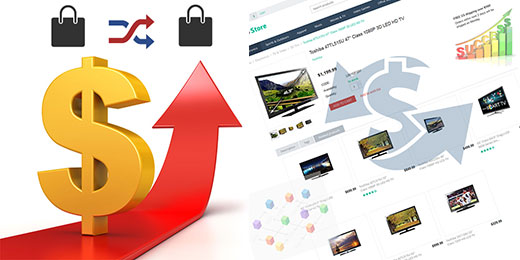
Today, we are extremely proud to present you the launch of Automatic Cross-Selling add-on for CS-Cart v 4 editions.
This add-on uses existing products data to automatically generate related items, up-sells and cross-sells for your entire catalog. So that when a store visitor views the details page of a certain product, he or she is offered other items as alternatives or in addition to the item on view.
Features:
- Automatic on-the-fly generate related products, up-sells and cross-sells for the entire store
- Selectable related products list layout: Grid, List without options, Compact list
- Fully customizable rules
- Related products by product name, by product search words, by product tags
- And many other...
More info: Automatic Cross-Selling v4
Cross-Sells and Upsells: What is the Diff?
Up-selling and cross-selling are two techniques that you can easily implement into your small business and if used effectively, they can make a big difference to your bottom line. Up-selling and cross-selling allow you to generate extra sales revenue by encouraging your existing customer base to purchase more or to make more frequent purchases.
An up-sell occurs where a customer is ready to order a product, or has already made a purchase from you, when you immediately offer an upgrade or addition to the deal. The most common example of up-selling occurs in fast food restaurants, where the customer makes an order and the cashier asks "would you like to upsize that meal for just sixty cents extra?" In many cases, the customer says yes because they feel that they are getting a better deal, even though they are paying more.
The same principle can be applied to almost any selling situation. The crucial feature of an effective up-sell is being able to offer the customer some incentive to buy the upgrade now as opposed to later or not at all. There should be either a discount for purchasing the upgrade or a significant benefit to be gained by purchasing the upgraded product or service. However, avoid pressure selling an upgrade or you'll risk losing the sale altogether.
Cross-selling is a strategy that small/big businesses can use to encourage existing customers to purchase additional or complimentary products from your range. The cross-sale doubles the return that you generate from the customer. Consider the potential of being able to cross-sell to all of your customers.
One of the first to use cross-selling to enhance their services, retain customers, attract new customers and stay competitive is Amazon. If you purchase a certain type of product, whether it is a book or CD, you will see a notification either at check-out or via email, to tell you that other customers, who bought this product, also enjoyed this very similar product. As soon as you purchase a certain type of business book, you will be notified of other similar books that are available. Amazons cross-selling methods are highly effective and provide additional value to customers whilst at the same time, increasing the site’s sales volume.
Ebay is another on-line site that promotes cross-selling. For example, if you are selling bath towels and also have bathroom accessories in your Ebay store, it would be a natural fit for a cross-selling opportunity. It makes sense, because it doubles the revenue on what would have been a single sale.
When used effectively, up-selling and cross-selling provide benefits to both the vendor and the customer. The key is to ensure that your upgrades or complimentary sales deliver on what they promise and add value to the initial purchase.
Share
Cheap VPS Hosting
- UpCloud, new accounts receive $25 in credit.
- DigitalOcean, new accounts receive $100 in credit (good for 60 days).
- Vultr, new accounts receive $100 in credit (good for 30 days).
Recommended products


